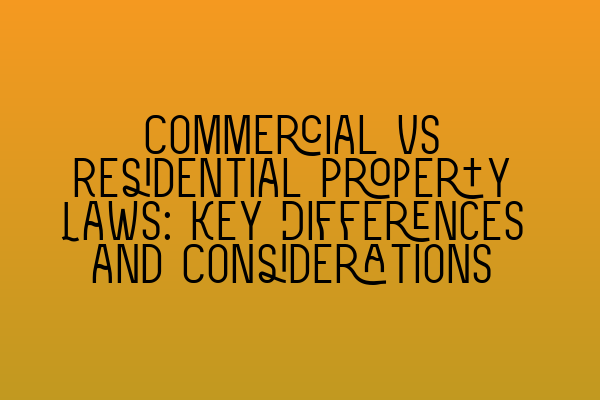Commercial vs Residential Property Laws: Key Differences and Considerations
When it comes to property law, there are important distinctions between commercial and residential properties. These differences not only impact the rights and obligations of both landlords and tenants, but also the legal frameworks and regulations governing these types of properties. Whether you are a property owner, a tenant, or a legal professional, it is crucial to understand the key differences and considerations associated with commercial and residential property laws.
In this blog post, we will delve into the specific aspects that differentiate commercial and residential properties, providing you with the necessary information to navigate these areas of property law with confidence.
1. Legal Definitions
First and foremost, it is essential to understand the legal definitions of commercial and residential properties. Commercial properties are typically spaces that are used for business or investment purposes, such as office buildings, retail stores, warehouses, and industrial properties. On the other hand, residential properties are primarily used for housing, including apartments, houses, condominiums, and mobile homes.
2. Tenancy Agreements
One of the significant differences between commercial and residential properties lies in the tenancy agreements. Commercial leases are generally more complex, longer in duration, and emphasize the commercial objectives of the parties involved. Commercial tenants frequently negotiate specific terms and conditions tailored to their business needs. In contrast, residential leases tend to be more standardized, with statutory protections in place to safeguard the rights of tenants.
3. Rent Control and Security of Tenure
Rent control and security of tenure are important considerations when dealing with residential properties. Many jurisdictions have regulations in place to ensure that tenants are protected from excessive rent increases and unjust evictions. On the other hand, commercial properties are subject to fewer rent control regulations, allowing landlords and tenants more flexibility when negotiating lease terms.
4. Planning and Zoning Regulations
Commercial and residential properties are also subject to different planning and zoning regulations. Local authorities typically restrict the use of certain properties for specific purposes, such as residential, commercial, or mixed-use. Commercial properties may require additional permits and licenses to operate legally, whereas residential properties are generally subject to fewer restrictions.
5. Property Taxes
Property taxes differ for commercial and residential properties. The rates and calculations for property taxes often vary depending on the property’s classification. Commercial properties are generally subject to higher tax rates due to their potential higher earning potential and investment value. In contrast, residential properties may benefit from exemptions and lower tax rates.
6. Landlord and Tenant Obligations
The obligations of landlords and tenants also differ significantly between commercial and residential properties. Commercial leases often require tenants to be responsible for repairs, maintenance, and other property expenses. Additionally, the terms of a commercial lease may grant tenants more flexibility to modify and adapt the property to suit their business needs. In residential properties, landlords typically bear the responsibility for property repairs and maintenance, ensuring the habitability and safety of the premises.
7. Dispute Resolution
In the event of disputes, the resolution process may vary between commercial and residential properties. Commercial property disputes are often resolved through negotiation, mediation, or arbitration. On the other hand, residential property disputes may involve alternative dispute resolution methods or landlord-tenant courts specialized in handling rental disputes.
Conclusion
Navigating the complexities of commercial and residential property laws requires a solid understanding of the key differences and considerations unique to each area. Whether you are a property owner, tenant, or legal professional, being well-informed about the legal definitions, tenancy agreements, planning regulations, tax considerations, and landlord-tenant obligations is crucial.
At SQE Property Law & Land Law, our team of expert solicitors is well-versed in both commercial and residential property laws. If you require expert advice or representation in navigating the intricacies of property law, do not hesitate to contact us.
For more information on legal exams, preparation courses, and exam dates, be sure to visit our related articles:
– SQE 1 Practice Exam Questions
– SQE 1 Practice Mocks FLK1 FLK2
– SQE 2 Preparation Courses
– SQE 1 Preparation Courses
– SRA SQE Exam Dates
Contact SQE Property Law & Land Law today for expert guidance in commercial and residential property matters.
